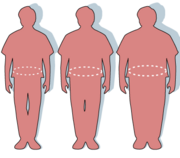Am I Overweight? Am I Obese?
Answers
What is Obesity?
Obesity is a chronic, debilitating and potentially fatal disease that requires treatment by a physician trained in bariatric medicine. It is marked by an excess accumulation of body fat sufficient to endanger health. The United States is currently suffering an obesity epidemic contributing to the premature death, sickness and suffering of millions of Americans.
Obesity results from a complex interaction of genetic, behavioral and environmental factors causing an imbalance between energy intake and energy expenditure. According to the National Institutes of Health, an increase in body weight of 20 percent or more above desirable weight is the point at which excess weight becomes an established health hazard. Lower levels of excess weight can also constitute a health risk, particularly in the presence of other disorders like diabetes, hypertension and heart disease.
“For people who are considered obese (BMI greater than or equal to 30) or those who are overweight (BMI of 25 to 29.9) and have two or more risk factors, the guidelines recommend weight loss. Even a small weight loss (just 10% of your current weight) will help to lower your risk of developing diseases associated with obesity. Patients who are overweight, do not have a high waist measurement, and have less than 2 risk factors may need to prevent further weight gain rather than lose weight.”
BMI is a reliable measure of body fatness and is currently a screening tool for weight categories that may lead to health problems. Since there are some limitations to basing treatment solely on the BMI measurement, we go the extra step by offering our patients a complete body composition analysis that not only measures BMI but also will measure body fat %, fat mass, fat-free mass and more in a non-intrusive and convenient manner.
Why do people become overweight or obese?
People do not become obese because they lack willpower. Obesity is a complex problem. It involves genetic factors, lack of physical activity, increased caloric consumption, some metabolic abnormalities, appetite regulation problems, and eating disorders, emotional and cultural factors. Overeating, a diet high in simple carbohydrates, slow metabolism, certain medications, psychological factors, and some medical conditions, such as hypothyroidism and many other. Research suggests that overweight people seem to have more fat cells than normal weight individuals. When people gain weight fat cells increase in size until a maximum fat content per cell is achieved. Weight loss can occur if the fat content per cell is reduced.
How prevalent is obesity? What are government statistics on obesity in the U.S.?
Globally, in 2020, The United States has the 12th highest obesity rate in the world of 36.2%.
— with population of 331M, approximately 120 million Americans are obese.
The CDC has tracked this increase, from 2000, when 30.5% of Americans were obese (BMI > 30), but also cases of severe obesity (BMI > 40) rising to 9.2% from 4.7%.
According to the 2017-2018 National Health and Nutrition Examination Survey:
- In 2017–2018, the age-adjusted prevalence of obesity in adults was 42.4%, [with] no significant differences between men and women among all adults or by age group.
- The age-adjusted prevalence of severe obesity in adults was 9.2% and was higher in women than in men.

Should I be concerned about my health just because I am overweight or obese?
Yes you should. Being overweight or obese has been associated with increased risks of developing other medical conditions such as:
- Heart Disease
- Diabetes
- Stroke
- High Blood Pressure
- High Cholesterol
- Sleep Apnea
- Liver Disease
- Gallbladder Disease
- Breast Cancer
- Prostate Cancer
- Colon Cancer
- Arthritis
- Gynecological problems
- Physical disability
- Sleep disturbances
- Breathing problems
Research has shown that even a 5 to 10 percent loss of the initial body weight can greatly reduce health risks and improve general well being.
What are the psychological consequences of obesity and being overweight?
People who are obese struggle with psychological problems such as depression, low self esteem and anxiety. It leads to social and economic discrimination. It decreases employment opportunities and opportunities for marriage.
What are emotional or psychological factors which predispose to obesity?
People may turn to food when their emotional needs are not being met. Food may become a substitute for love. For some people food may become a mood elevator and they eat even when they are not hungry to release stress.



